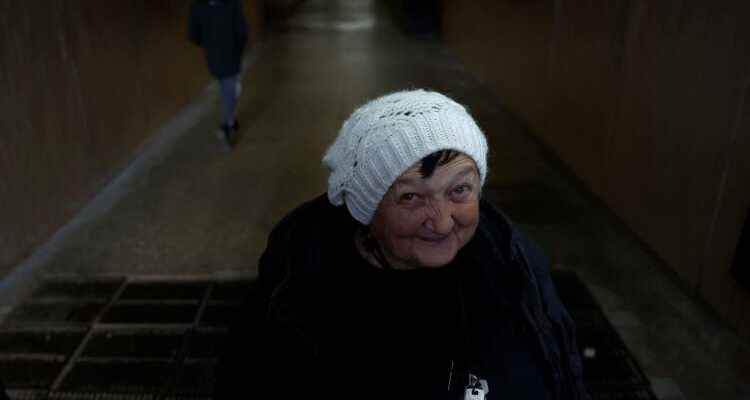Sergei Gerasimov is holding out in Kharkiv. In his war diary, the Ukrainian writer reports on the horrific and absurd everyday life in a city that is still being shelled.
An old woman who lives in the Kharkiv metro and still carries around the old house keys.
November 22, 2022
I’m standing in front of a nine-story apartment block that’s punctured like cheese.
I stare at the largest of the holes in its wall. The gap is three or four apartments wide. Many rooms have turned their inside out. They appear undamaged apart from the fact that they are missing the front walls and floors. Nothing is burned and nothing looks broken. Nothing is torn or tattered. All combustible and fragile things must have fallen, buried under concrete debris and rubble.
The rooms hanging above it look tidy and even livable when I imagine transparent walls and floors in them. I see them all at the same time because the lower rooms are lower than the higher ones. This means that the projectile or missile that caused the impact must have had an inclined trajectory and penetrated the wall of the block of flats at an angle of 45 degrees.
I venture closer and now the rooms are hanging over me.
It’s a strange sight. I feel like a fish poking its head out of the water in its round glass and staring at the world of people above and around it. Of course, the ceilings are the quietest parts of the rooms. They have chandeliers hanging from them, and none of their lamps are broken: the grenade or the rocket probably cut through walls and floors as smooth as a knife through softened butter.
Interior doors catch my eye. Some of them are open, some are not. Some are just a crack open, as if someone tried to peek in from the other side. It’s odd that some furniture, such as bookcases, are still hanging on the walls because they’re somehow connected to the central heating batteries or gas lines. I even see a small desk miraculously floating in empty air on the sixth floor.
The round clock above a decorative white bedroom door (of course the beds are missing) seems to show the correct time, namely two o’clock in the afternoon. I think that’s almost impossible. Can a battery work for nine months? I don’t know it.
“Even the clock works,” I say to an old woman who walks by with two large empty plastic bottles in her hands.
She stops and looks up. “Where?” she asks.
“Over there, over the white door,” I say. She blinks and looks up. Her eyesight is probably impaired. She finally sees the clock, but cannot make out what time it is showing.
“It’s nothing,” she says. “If you go there, you will see entire buildings lying on the ground.” She points in the direction with her hand.
“I know,” I say.
Everyone here has their story and most are happy to tell it.
“I lived in this house with my son,” says the old woman, pointing to the rooms above. “When they started bombing us it was very scary but I told myself I have my son with me so I was a lucky woman. So we stayed where we were. My son was always with me. Always.”
She talks about her son all the time. About how much she loved him and how lucky she was to be close to him. But she speaks of him in the past tense and I can’t bring myself to ask where he is now. When I look at the rooms without floors and walls, I can guess that nothing good can have happened to him.
The old woman continues to talk about her son in a strangely incoherent manner. I can’t fathom if he’s still alive or not.
It strikes me once again that old people living in buildings that have been heavily shelled seem a little out of character. Not insane or insane, but as if they had received a severe blow to the head and then opened their eyes. And we still don’t fully understand what happened, where and who they are.
“I’ve always been a happy woman,” the woman repeats. “My son was always with me. My son, my son, my son.”
To person

Sergei Gerasimov – What is the war?
Of the war diaries written after the February 24 Russian invasion of Ukraine, those of Sergei Vladimirovich Gerasimov are among the most disturbing and touching. They combine the power of observation and knowledge of human nature, empathy and imagination, a sense of the absurd and inquiring intelligence. Gerasimov was born in Kharkiv in 1964. He studied psychology and later wrote a psychology textbook for schools and scientific articles on cognitive activity. His literary ambitions have so far been science fiction and poetry. Gerasimov and his wife live in the center of Kharkiv in an apartment on the third floor of a high-rise building. The NZZ published 71 “Notes from the War” in the spring and 69 in the summer. The first part is now available as a book on DTV under the title «Feuerpanorama». Of course, the author does not run out of material. – Here is the 65th contribution of the third part.
Translated from the English by Andreas Breitenstein.
